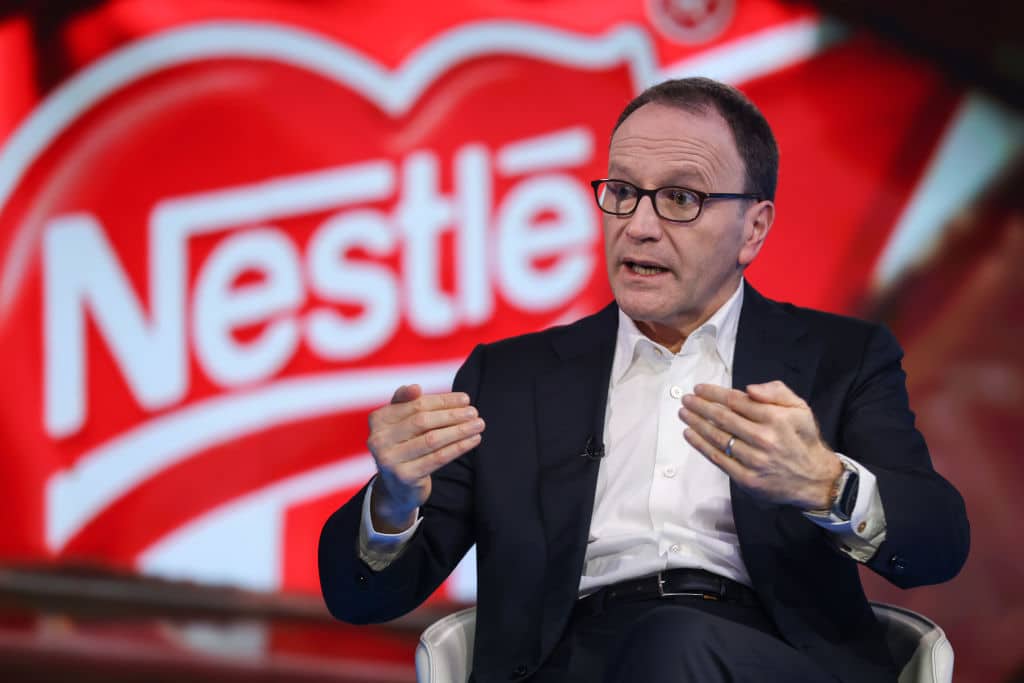TOPLINE
Nestlé is tapping into the lucrative weight loss drug market by catering to customers’ “shifting” nutritional needs, CEO Mark Schneider told CNBC on Thursday, an optimistic pivot from one of the industry’s biggest players in the face of dire early predictions suggesting wildly popular drugs like Ozempic, Mounjaro and Wegovy would take a bite out of the food industry.
KEY FACTS
When GLP-1 drugs like Ozempic and Wegovy really started taking off, the food industry and investors initially feared people would just eat less food, Schneider told CNBC’s Silvia Amaro, affecting industry profits in the process.
These fears have since transformed into a sense of opportunity, Schneider said, explaining that the nutritional needs of customers’ on the drugs are “just shifting,” rather than going away completely.
“Consumers still have nutritional needs, but they may be different from someone who is not on a weight loss regimen,” he said, noting that people on GLP-1 drugs should take care to ensure they get enough nutrients and vitamins from the food they eat, as well as enough protein to retain muscle mass.
Schneider said the different needs of people using weight loss drugs open up a big market opportunity for companies like Nestlé, which he said has big plans to respond to what has rapidly become a “major consumer trend.”
Loading...
He said Nestlé has an “ambitious goal” to fulfill this need by pushing healthier “companion products,” including the company’s upcoming frozen food line, Vital Pursuit, which is geared towards GLP-1 users and due to launch later this year.
Schneider also hinted at Nestlé launching further “companion offerings” targeting consumers taking obesity drugs, though he did not indicate what these would be or when they might launch.
Get Forbes Breaking News Text Alerts: We’re launching text message alerts so you’ll always know the biggest stories shaping the day’s headlines. Text “Alerts” to (201) 335-0739 or sign up here.
CRUCIAL QUOTE
Schneider said new lines and offerings targeting GLP-1 drug users will be an “addition” to the food and drinks industry moving forward, rather than its sole focus. “Remember, there’s going to be a lot of consumers out there that are not on a GLP-1 diet,” he told CNBC. “And there is lots [sic]
of situations where a snack and a chocolate product may still be of a lot of interest.” Many products geared towards GLP-1 drug users will likely “make a lot of sense to consumers” on any kind of weight loss journey, he said. “The same fundamentals apply, and that is you want to be sure that you’re losing fat and not lean muscle mass and you want to be sure that you don’t develop any vitamin deficiencies.”
KEY BACKGROUND
While there have always been profits to be found in the weight loss industry, a growing class of drugs called GLP-1 agonists have upended the sector in recent years. This is largely through their ease of use and unparalleled efficacy. By mimicking the action of a gut hormone involved in regulating appetite and blood sugar, GLP-1 drugs offer a degree of weight loss previously unattainable except through surgery and research indicates they may be able to help with a myriad of other conditions too, including sleep apnea, addiction, anxiety, Parkinson’s and kidney disease. They are currently authorized for treating diabetes, cardiovascular problems and obesity. Drug titans Novo Nordisk and Eli Lilly — which respectively produce semaglutide, the drug inside Ozempic and Wegovy, and tirzepatide, the drug inside Zepbound and Mounjaro — dominate the field and are experts anticipate they will continue to see off rivals for some time, despite chronic shortages. The food industry, as well as other industries aligned with weight loss, initially feared the soaring popularity of the drugs would eat into sales, though the long term impact has yet to be seen.
.
Loading...
